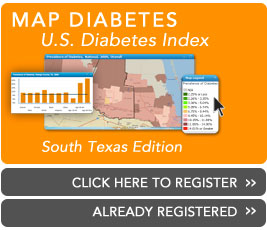Posted by Staff
Minority Diabetes Reports
Thursday, February 28th, 2013
The Diabetes Educator: February 25, 2013
Purpose The purpose of this article is to describe methods used to recruit and retain high-risk, Spanish-speaking adults of Mexican origin in a randomized clinical trial that adapts Diabetes Prevention Program (DPP) content into a community-based, culturally tailored intervention.
Methods Multiple passive and active recruitment strategies were analyzed for effectiveness in reaching the recruitment goal. Of 91 potential participants assessed for eligibility, 58 participated in the study, with 38 in the intervention and 20 in the attention control group. The American Diabetes Association Risk Assessment Questionnaire, body mass index, and casual capillary blood glucose measures were used to determine eligibility. Read more
Posted by Staff
Minority Diabetes Reports
Thursday, February 28th, 2013
The Diabetes Educator: February 22, 2013
Purpose The purpose of this study was to examine the implementation, use, and sustainability of a computerized touch-screen diabetes education kiosk (Diosk) designed to provide “on-demand” education in a predominantly Latino community in South Texas.
Methods A pilot study was conducted to examine the implementation, use, and sustainability of the Diosk in 5 settings (eg, clinics, community centers, and pharmacies) serving low-income, low-literacy populations. Both quantitative and qualitative data from embedded computerized usage tracking, user surveys, and key stakeholder interviews were collected and analyzed using descriptive statistics. Read more
Posted by Staff
Minority Diabetes Reports
Thursday, February 28th, 2013
he Diabetes Educator: February 20, 2013
Purpose To examine challenges in diabetes self-management among Korean Americans to guide clinicians in providing culturally appropriate and population-targeted diabetes care.
Methods Five focus groups with 23 Korean Americans with type 2 diabetes, 30 to 75 years of age, were conducted. Open-ended questions were presented focusing on previous experiences in living with diabetes; digital recordings were transcribed verbatim; transcripts were coded and themes were identified. Read more
Posted by Staff
Clinical Trials
Thursday, February 28th, 2013
Diabetes Care :February 25, 2013
OBJECTIVE To evaluate the effects of two bariatric procedures versus intensive medical therapy (IMT) on β-cell function and body composition.
RESEARCH DESIGN AND METHODS A prospective, randomized, controlled trial of 60 subjects with uncontrolled type 2 diabetes (HbA1c 9.7 ± 1%) and moderate obesity (BMI 36 ± 2 kg/m2) randomized to IMT alone, IMT plus Roux-en-Y gastric bypass, or IMT plus sleeve gastrectomy. Assessment of β-cell function (mixed meal tolerance testing) and body composition were performed at baseline and 12 and 24 months. Read more
Posted by Staff
Clinical Trials
Thursday, February 28th, 2013
Diabetes Care: February 22, 2013
OBJECTIVE The effect of therapeutic strategies on cardiovascular (CV) disease can be evaluated by monitoring changes in CV risk biomarkers. This study investigated the effect of a structured self-monitoring of blood glucose (SMBG) protocol and the resulting improvements in glycemic control on changes in high-sensitivity C-reactive protein (hs-CRP) in insulin-naïve patients with type 2 diabetes.
RESEARCH DESIGN AND METHODS The Structured Testing Program (STeP) study was a prospective, cluster-randomized, multicenter trial in which 483 poorly controlled, insulin-naïve patients with type 2 diabetes were randomized to active control (ACG) or structured testing (STG) that included quarterly structured SMBG. Changes in A1C, hs-CRP, and glycemic variability (STG subjects only) were measured at baseline and quarterly. Read more
Posted by Staff
Clinical Trials
Thursday, February 28th, 2013
Diabetes Care: February 22, 2013
OBJECTIVE The effect of therapeutic strategies on cardiovascular (CV) disease can be evaluated by monitoring changes in CV risk biomarkers. This study investigated the effect of a structured self-monitoring of blood glucose (SMBG) protocol and the resulting improvements in glycemic control on changes in high-sensitivity C-reactive protein (hs-CRP) in insulin-naïve patients with type 2 diabetes.
RESEARCH DESIGN AND METHODS The Structured Testing Program (STeP) study was a prospective, cluster-randomized, multicenter trial in which 483 poorly controlled, insulin-naïve patients with type 2 diabetes were randomized to active control (ACG) or structured testing (STG) that included quarterly structured SMBG. Changes in A1C, hs-CRP, and glycemic variability (STG subjects only) were measured at baseline and quarterly. Read more
Posted by Staff
Clinical Trials
Thursday, February 28th, 2013
BMC Medicine: February 20, 2013
Background
Management of type 2 diabetes with metformin often does not provide adequate glycemic control, thereby necessitating add-on treatment. In a 24-week clinical trial, dapagliflozin, an investigational sodium glucose cotransporter 2 inhibitor, improved glycemic control in patients inadequately controlled with metformin. The present study is an extension that was undertaken to evaluate dapagliflozin as long-term therapy in this population.
Methods
This was a long-term extension (total 102 weeks) of a 24-week phase 3, multicenter, randomized, placebo-controlled, double-blind, parallel-group trial. Patients were randomly assigned (1:1:1:1) to blinded daily treatment (placebo, or dapagliflozin 2.5, 5, or 10 mg) plus open-label metformin ([greater than or equal to]1,500 mg). The previously published primary endpoint was change from baseline in glycated hemoglobin (HbA1c) at 24 weeks. This paper reports the follow-up to week 102, with analysis of covariance model performed at 24 weeks with last observation carried forward; a repeated measures analysis was utilized to evaluate changes from baseline in HbA1c, fasting plasma glucose (FPG), and weight. Read more



























